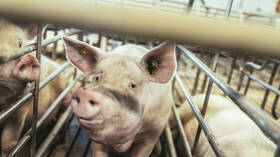EU state reports ‘highly pathogenic’ bird flu outbreak

An outbreak of the highly contagious H5N1 avian influenza has been reported on a poultry farm in the northwestern part of Belgium, according to the World Organization for Animal Health (WOAH).
In a Monday statement quoted by Reuters, the Paris-based organization said that the outbreak was detected in the city of Diksmuide near France and that at least 95 birds died of the infection while the rest of the flock, consisting of 20,100 birds, had been culled.
Previously, German authorities also reported on Friday that 11,500 turkeys had to be slaughtered after an outbreak of the highly pathogenic virus was detected at a farm in the eastern state of Brandenburg.
In the Netherlands, outbreaks have been detected at a laying hen farm, prompting the culling of approximately 110,000 chickens, and at a petting zoo, where some 90 birds that posed a risk of spreading the virus were slaughtered.
Another outbreak was also reported by the French Ministry of Agriculture last week at a turkey farm in northwest France, prompting authorities to raise the national alert level for bird flu from ‘negligible’ to ‘moderate.’
In recent years, the H5N1 avian influenza has led to the culling of hundreds of millions of birds worldwide. In Europe, outbreaks typically occur in autumn and winter, and this season has also already seen cases detected on farms in Italy, Croatia, and Hungary, in addition to those previously mentioned.
Influenza epidemics in animals carry the threat of severe economic repercussions on farming and even pose a risk, albeit low, to public health as some variants of the virus are capable of being transmitted to humans.
In a July report, the World Health Organization noted that, since December 2021, only eight cases of humans contracting the H5N1 virus have been reported. These infections were attributed to close contact with infected birds and contaminated environments.
“With the information available so far, the virus does not appear to be able to transmit from one person to another easily, but vigilance is needed to identify any evolution in the virus that can change that,” said the WHO’s director of epidemic and pandemic preparedness and prevention, Dr. Sylvie Briand.














